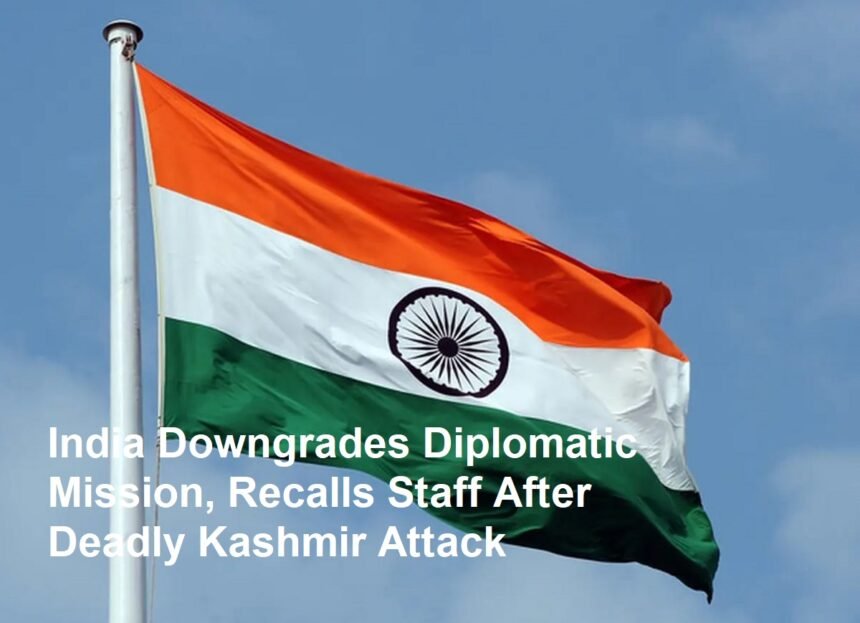India announced a series of diplomatic measures against Pakistan on Thursday in response to a deadly militant attack on civilians in the Pahalgam region of Jammu and Kashmir. The Ministry of External Affairs stated it would reduce the number of its diplomatic staff in Islamabad and recall several officials as part of a broader downgrading of bilateral ties. These steps follow India’s formal summoning of Pakistan’s top envoy in New Delhi and the suspension of key bilateral agreements in what New Delhi termed a “calibrated response” to cross-border terrorism allegations.
On April 22, gunmen targeted a convoy of tourists near the Lidder River in Pahalgam, killing 26 people—mostly Indian nationals—and injuring several others. The previously unknown militant group “Kashmir Resistance” claimed responsibility, but Indian authorities immediately accused Pakistan’s Inter-Services Intelligence of orchestrating the attack from across the Line of Control. Local police confirmed that two of the suspects were Pakistani nationals, prompting outrage in New Delhi and widespread protests in Srinagar.
In the wake of the assault, India expelled two senior Pakistani diplomats from its High Commission in New Delhi and announced a reduction in its own embassy staff in Islamabad to just 30 accredited diplomats. The government also declared the temporary suspension of the 1960 Indus Waters Treaty, a landmark World Bank-brokered agreement, and closed the Attari–Wagah border checkpoint to all traffic. Defence Minister Rajnath Singh described these measures as necessary to “protect national security and send an unequivocal message” to Pakistan.
Prime Minister Narendra Modi, cutting short a visit abroad, condemned the Pahalgam massacre as “an assault on humanity” and vowed to pursue the perpetrators “to the ends of the Earth.” He pledged that India would hold accountable not only the attackers but also any state actors found complicit in planning or facilitating the operation. Union Home Minister Amit Shah traveled to Srinagar to coordinate security reinforcements and personally oversee the probe into the attack.
Pakistan’s Foreign Ministry responded by denying any direct involvement, offering “moral and diplomatic support” to the victims’ families, and calling India’s decision to suspend the water treaty an act of “hydro-diplomatic aggression.” Islamabad accused New Delhi of exploiting the tragedy to divert attention from its own human-rights record in Kashmir. Pakistan’s Prime Minister expressed condolences but warned that further unilateral moves could destabilize the already fragile peace in South Asia.
The Pahalgam attack and India’s subsequent diplomatic crackdown mark the most severe rupture in ties since New Delhi abrogated Article 370 in 2019, revoking Jammu and Kashmir’s special autonomy. That move had already sparked cross-border artillery exchanges and reciprocal airstrikes. Analysts warn that sustained tit-for-tat measures—including visa suspensions, trade curbs, and embassy downsizing—could escalate into a broader security crisis between the two nuclear-armed neighbours.
International reaction to the unfolding row has been cautious. The United States and the European Union called for restraint and urged both sides to use established diplomatic channels. China, which maintains close ties with Pakistan, appealed for de-escalation and offered to mediate. Meanwhile, voices within India’s parliament intensified calls for a firm stance, with opposition leaders criticizing the government for perceived intelligence failures that allowed the assault to occur.
As New Delhi and Islamabad navigate this crisis point, the durability of South Asia’s uneasy peace hangs in the balance. India has made clear that restoring normal diplomatic engagement will depend on verifiable action against terrorist networks operating from Pakistan territory. For now, the recall and reduction of embassy staff—alongside treaty suspensions—represent New Delhi’s strategy of targeted pressure, aiming to compel Islamabad to curb cross-border militancy without immediately severing official ties.









